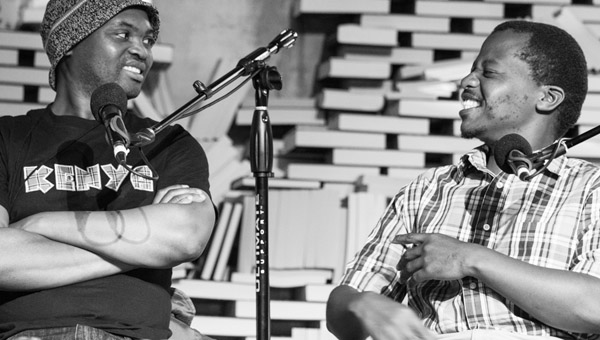Writings of Wrongs, 9 September 2013, Fugard Studio. Hlumelo Biko, Kgebetli Moele, Niq Mhlongo and Nthikeng Mohlele in conversation with Meg Samuelson.
CHANTELLE GRAY VAN HEERDEN
In this sensitive, yet highly charged political session, Meg Samuelson spoke to Hlumelo Biko, Kgebetli Moele, Niq Mhlongo and Nthikeng Mohlele about their latest works of fiction and non-fiction, how they feel about the transformations taking place in our country, and how they address it through writing. The issue at hand was why, after 20 years of post-Apartheid living, it is still necessary to write about what is wrong in South Africa. What was expressed by all the panellists was how literature allows for writers to talk about the political, economic and social strata which are ignored by the media and swept under the rug by politicians who both influence public opinion and ignore how these echelons have remained segregated. This segregation seems more evident in the physical layout of the land in the Western Cape when compared to the so-called “economic ladder” that lays out the land in a city like Johannesburg.
I asked the panel if they thought that our citizens haven’t become too depoliticised, basking in the often invoked rhetoric of the “rainbow nation”, where the ideal seems to be to make it to a middle class lifestyle rather than addressing the fact that there are class differences at all and how some people have to live in shacks every day while others live on more land than they know what to do with.
Biko's response was optimistic. He said that even though he writes what could, ostensibly, be seen as what is wrong in our country, he does think that we have made progress and that it should be acknowledged. Moele was less convinced and took quite a strong political stance. He spoke about how, all too often, we forget our histories, which leads to artificial or surface changes to “keep people happy”. He also noted that novels should be reflecting this not only about, but also to society. Mhlongo emphasised the fact that for him, literature looks at what society is and therefore describes both the good and the bad. To end the session, Nthikeng Mohlele summarised the heart of these issues so poignantly that I would like to end this report by quoting him.
“I think that to actually come to a coherent answer would be very slippery… We must bear in mind that in the smaller transitions that we live [which] might look like something that we take for granted, […] from just a grand nation brand point of view, it is quite a big thing. And because there is no channelled thinking at the level of state to the people, it’s not that people are necessarily depoliticised per say. What we also have to bear in mind is that these transitions – personal, private, or whatever – we’re living in a world that is constantly in transition… So I think that if I were president – not that I’d like to be – but if I were for a week, I’d worry about shacks in Cape Town now, but I’d also think about what kind of South Africa I would want in 2078. Build that vision for 2078 and work backwards… It can’t be isolated fragmented things… Transition, whether personal or national, has political consciousness and has to take into account that the world is not a static place but moves around us.”
 SLiPStellenbosch Literary Project
SLiPStellenbosch Literary Project 